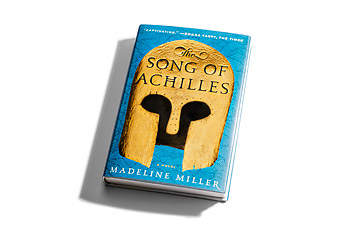
The author's day job is teaching high school Latin and Greek
The Achilles of Homer's The Iliad always seemed a bit of a head case, even by the standards of teenagers who first encounter him in high school lit classes. He had those anger issues, the ones that caused him to sit out a crucial part of the Trojan War to spite Agamemnon. Then there was his dramatic outpouring of grief over Patroclus. At the news that his comrade had been slain by the enemy, Achilles--the Greeks' greatest warrior--sprawled in the dust, told his mother he'd "lost the will to live" and even, Homer tells us, spent some time facedown on the corpse.
Such big love has raised an intriguing question throughout the ages: Were Achilles and Patroclus more than comrades or, as some stories describe them, cousins? The Song of Achilles, the debut novel by high school Latin and Greek teacher Madeline Miller, answers with a resounding yes. Her Song, which just made the New York Times best-seller list and is in the running for the U.K.'s prestigious Orange Prize, is a wildly romantic retelling of the Trojan War as a story of longtime companions narrated by Patroclus. Miller plays with the historical record as established by Homer; skillfully dodges that which might refute her premise, including Achilles' interest in slave girls and his siring a son, Pyrrhus; and puts a sexy new narrative spin on the ancients that is surprisingly suspenseful. Some of that suspense comes from curiosities, like who will tell the story after Patroclus dies, but most of it comes from the urgency of Miller's storytelling.
Homer, and perhaps conservative historians like Professor Gingrich, might take issue with this portrayal of the ultimate soldier as unwavering homosexual. ("I did not like it," Achilles tells Patroclus, referring to sex with Pyrrhus' mother. "It was not you.") But Miller isn't exactly going out on a limb. Plato and Aeschylus paired Achilles and Patroclus romantically as well.
In Song, the future lovers meet as 5-year-olds at a footrace and are reunited when Patroclus is banished to Achilles' father's kingdom. By the time they are 13, there are the first of many "stirrings" in this tunic tearer, followed some years later by couplings of the trembling, swelling and limbs-slipping-over-limbs variety. (It's all very magical, but sometimes a penis should just be called a penis.)
Achilles never got the 20th century treatment from literary classicist Mary Renault, Miller's stylistic godmother, but in the 21st century, he's had a macho moment played by Brad Pitt in Troy and was depicted as an arrogant bore in 2003's The Songs of the Kings, Barry Unsworth's novel about the slaughter of Agamemnon's daughter Iphigenia. Miller's Achilles is so sensitive, Patroclus has to lead him--blood-spattered and pale--away from Iphigenia's sacrifice, whispering "all the bits of broken comfort I could find."
